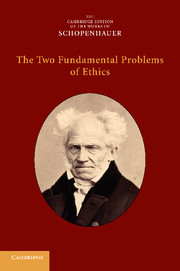Book contents
- Frontmatter
- Contents
- General editor's preface
- Editorial notes and references
- Introduction
- Notes on text and translation
- Chronology
- Bibliography
- THE TWO FUNDAMENTAL PROBLEMS OF ETHICS
- Contents
- Preface to the first edition
- Preface to the second edition
- Prize essay on the freedom of the will
- Prize essay on the basis of morals
- Variants in different editions
- Glossary of names
- Index
Prize essay on the basis of morals
Published online by Cambridge University Press: 06 November 2009
- Frontmatter
- Contents
- General editor's preface
- Editorial notes and references
- Introduction
- Notes on text and translation
- Chronology
- Bibliography
- THE TWO FUNDAMENTAL PROBLEMS OF ETHICS
- Contents
- Preface to the first edition
- Preface to the second edition
- Prize essay on the freedom of the will
- Prize essay on the basis of morals
- Variants in different editions
- Glossary of names
- Index
Summary
Motto:
Moral predigen ist leicht, Moral begründen schwer
[Preaching morals is easy, grounding morals hard: Schopenhauer, On the Will in Nature]The question set by the Royal Society, together with the introduction that prefaces it, runs as follows:
Quum primitiva moralitatis idea, sive de summa lege morali principalis notio, sua quadam propria eaque minime logica necessitate, tum in ea disciplina appareat, cui propositum est cognitionem τοῦ ἠϑικοῦ explicare, tum in vita, partim in conscientiae judicio de nostris actionibus, partim in censura morali de actionibus aliorum hominum; quumque complures, quae ab illa idea inseparabiles sunt, eamque tanquam originem respiciunt, notiones principales ad το ἠϑικον spectantes, velut officii notio et imputationis, eadem necessitate eodemque ambitu vim suam exserant, – et tamen inter eos cursus viasque, quas nostrae aetatis meditatio philosophica persequitur, magni momenti esse videatur, hoc argumentum ad disputationem revocare, – cupit Societas, ut accurate haec questio perpendatur et pertractetur:
Philosophiae moralis fons et fundamentum utrum in idea moralitatis, quae immediate conscientia contineatur, et ceteris notionibus fundamentalibus, quae ex illa prodeant, explicandis quaerenda sunt, an in alio cognoscendi principio?
In translation:
Since the original idea of morality, or the chief concept of the highest moral laws, appears with its own peculiar, though by no means logical, necessity both in that science whose end-purpose is to expound knowledge of the ethical and also in real life, where it is seen partly in the judgment of conscience about our own actions, partly in our moral judging of the actions of others; and since moreover a number of chief moral concepts that are inseparable from that idea and have arisen out of it, e.g. the concept of duty and that of accountability, claim validity with the same necessity and in the same compass.
- Type
- Chapter
- Information
- The Two Fundamental Problems of Ethics , pp. 113 - 258Publisher: Cambridge University PressPrint publication year: 2009
- 1
- Cited by

